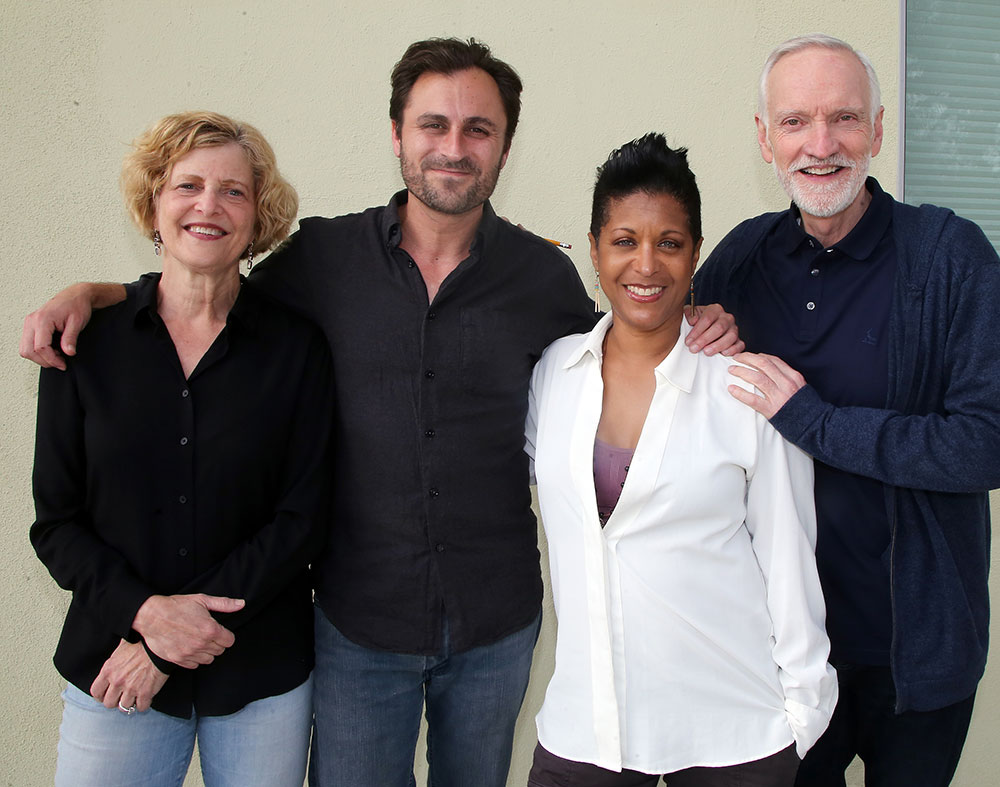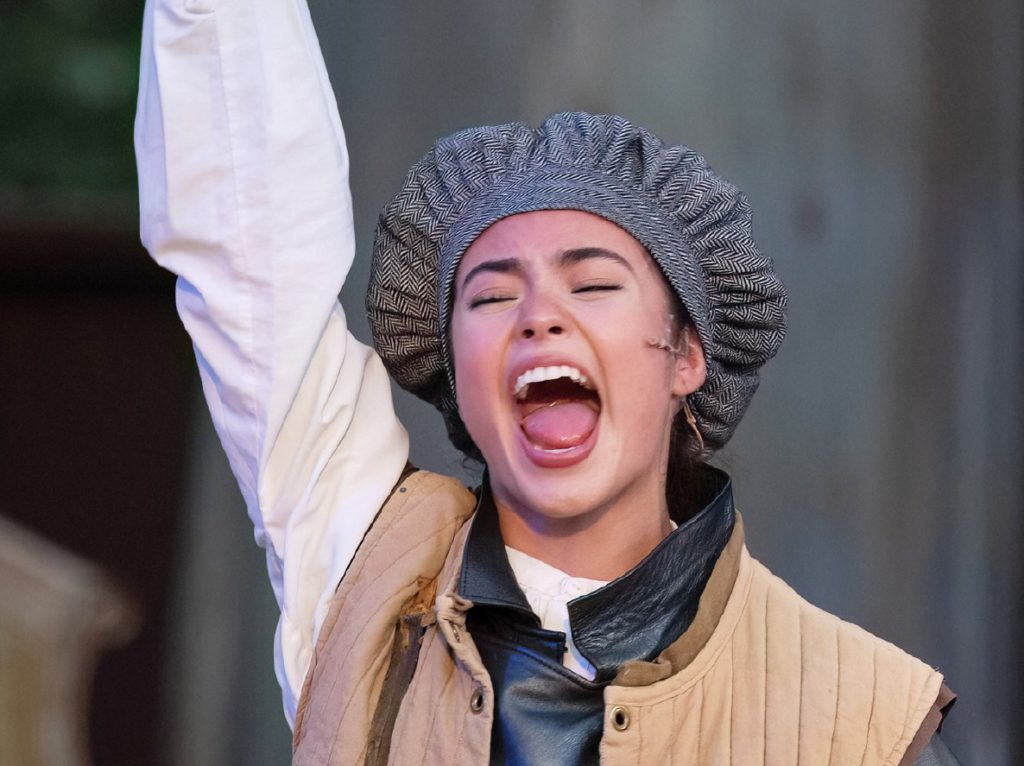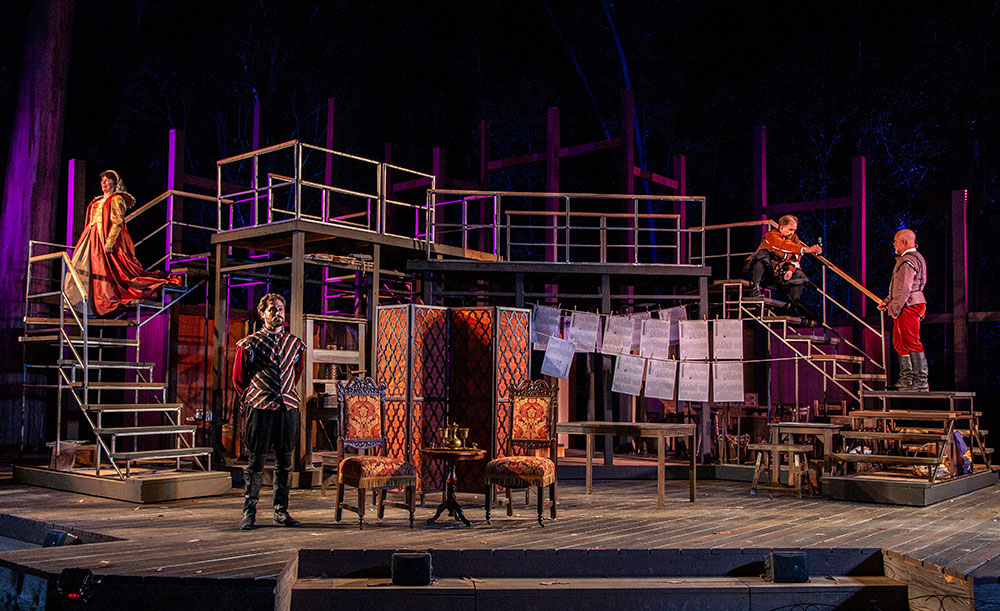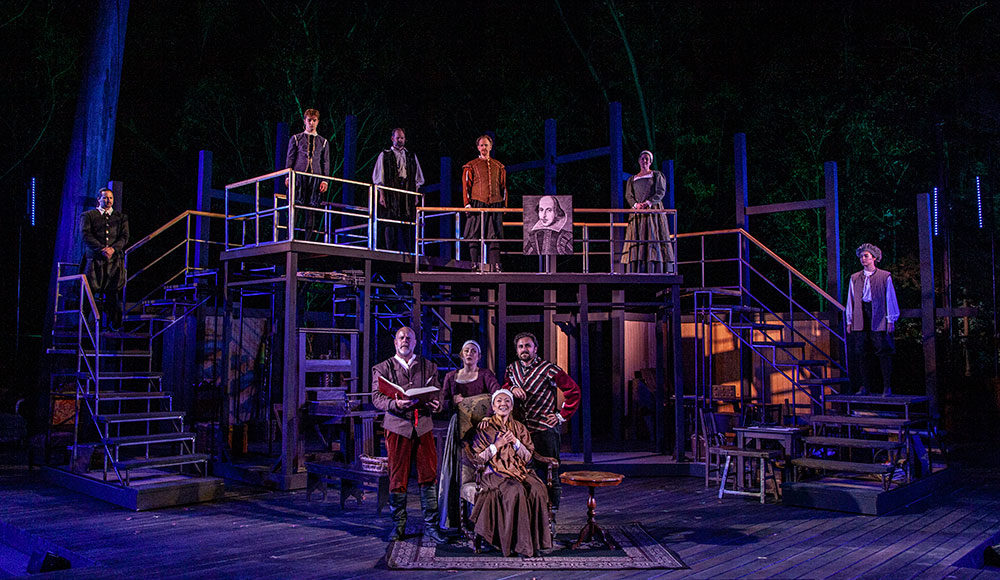How does a director transform a well-known theater piece into a fresh experience? Or apply a concept to a 450-year-old masterpiece that shines new light on world-famous characters?
Each of the shows in the 2024 Santa Cruz Shakespeare season is well-known to audiences throughout the English-speaking world, and beyond. But not all the juicy parts belong to the actors. One of the most challenging roles in theater is the task of rethinking a very famous work of performative art. And that belongs to the director.
In Hamlet, arguably the most famous play ever written, Shakespeare examines the multi-generational struggles incited by a dead father, an outraged son, a duplicitous mother and a murderous step-father.
As You Like It finds one of Shakespeare’s boldest characters, Rosalind, escaping the world of her uncle and exploring the meaning of falling in love.
Oscar Wilde’s The Importance of Being Earnest sparkles with wit and deceit as it dismantles the way an older generation is viewed through the lens of youthful romance.
And finally, in the SCS season’s unprecedented fourth offering, Tennessee Williams’ early masterwork The Glass Menagerie probes maternal obsession and young love lost.
Each of these four plays is ridiculously famous. Many in the SCS audience will go because they have enjoyed the plays many times. Others will buy tickets because they’ve heard the names but never seen them performed. But as opening night approaches, many are excited to find out how the director will refresh a vintage script. How will they breathe new life into the work?
For some clues, I asked each of the directors of the 2024 season to discuss their approach to the work.

CAREY PERLOFF
AS YOU LIKE IT
Carey Perloff brings to Santa Cruz an acclaimed career as an actor, collaborator (Tom Stoppard, among others), author, playwright and artistic director of San Francisco’s American Conservatory Theater (1992-2018).
How will you set this play?
The whole play is a rehearsal. I am asking you to imagine that going to the Forest of Arden is going backstage. And I think it will give us a lot of freedom to play. And it lets an audience have a window into what it is that we do. What I realized, as I started to really dig into the play, is that at least to my reading, it is a play about rehearsing.
Falling in love for the first time is a sensation that you think you’re the only person that’s ever felt that, you know, we all think that nobody’s ever felt this way before. Orlando thinks he’s fallen madly in love with Rosalind. And Rosalind has fallen in love with him. Actually teach him what it means to really love someone, not just go through the social conventions. But what is it really to love? So, she, in disguise, says to him, I’ll pretend to be Rosalind and you will pretend to woo me. They are rehearsing this relationship. I’m wondering, how can we use all the tools of theater to get closer to something that’s authentically true?
So I started thinking about what happens to us theater people in rehearsal. And how beautiful the backstage process is that the audience never gets to see. When we rehearse, we have wardrobe racks that have rehearsal skirts and rehearsal corsets and maybe rehearsal doublets. And maybe there are rehearsal swords or guns or weapons, and there’s rehearsal food, and there’s a rehearsal bouquet that is the prop for the wedding. And we grab what we need, and we imagine what it needs to be. And I always think that the final run-through in the rehearsal room is the most beautiful work that anybody does. In this production I am asking you to imagine that going to the forest is going backstage.

of ‘The Book of Will.’ PHOTO: Kevin Lohman
There’s a lot of Shakespearean wordplay, a lot of disguise within disguise. What can 21st-century audiences, specifically younger ones, find to hook them in?
I think one of the sorrows that we’re going through as a culture right now is that we don’t know how to emerge from COVID. Many young people are lonely, and have to learn again how to be together, how to fall in love, how to talk to each other. We have sort of forgotten what it is to actually be together in a group. The beginning of As You Like It is the most polarized, nasty world; there is incredible jealousy and antipathy and violence. Then they go into the forest and the characters have to learn how to have friends again, how to be together again, how to enjoy each other again.
Also I have this amazing costume designer who gets to really play. What has always bothered me in productions of As You Like It is that they’re in the middle of the forest of Arden with nothing and suddenly they’re all there for the wedding dressed in couture clothes as if they’ve just had fittings at the salon. I think, wait a minute—what? So this production will look very DIY and fun—a rehearsal corset with a hoodie over it, a long skirt, and your own outdoor boots—all kind of spontaneous.
Yes, there’s a lot of wordplay and a lot of quite challenging language.
They use very elevated language to try and get the other person to fall in love with them. And then there comes a moment in the play where Orlando says to Rosalind, I can live no longer by thinking, and what he means is I don’t want to imagine anymore. I have to be with the woman I love. The closer we get to a kind of honest love relationship, language gets simpler and simpler because when you really care about somebody.
Why did you say yes to Santa Cruz Shakespeare?
I think one thing that’s so much fun about Santa Cruz Shakespeare is the repertory aspect. And they are doing multiple roles all through the season. That’s one of the things I liked. It’s a real company where the actors constantly have to transform.
PAUL MULLINS
THE IMPORTANCE OF BEING EARNEST
A longtime favorite director with Santa Cruz Shakespeare, where he directed Pride and Prejudice and 2023’s King Lear as well as many Jewel Theatre productions, Mullins is based in San Francisco but criss-crosses the country, directing most recently with companies in Florida, New York, New Jersey and Washington.
Older audiences have all heard of The Importance of Being Earnest. But young people who grew up on cell phones might wonder, why should they be watching this 19th-century play?
When Charles asked me to direct the play, I was very intrigued. As a young actor many years ago, I was in the play. That was my real first knowledge of the play. So I looked forward to looking at something that I hadn’t seen in 30 odd years. I think the reason that this play still is not only valuable but necessary is that Oscar Wilde was a very smart besides being a very witty man. I think it’s an amazing piece of work. It sort of stands on its own, especially now in a world that doesn’t make a lot of sense to us, and in some ways is a foreign place.
It talks about the society in which Wilde lived and yet it’s also about any time. In every society, how you behave, how you follow the rules, how you do the things the way they’ve always been done, is at war with what I want, what I desire, my desire for freedom from rules. And I think that’s the beauty of it. It’s a very generous play about people and the way we are and are not satisfied with life, with love, with fortune. It’s also a very funny play about how people behave with each other. What interests me is what’s underneath the play. Besides the funny wit, besides the well spoken line.
What it says about the way they live in their world in much the same way as it says something about the way we live in ours.
Why Oscar Wilde in a Shakespeare Festival?
It’s very like Shakespeare in that it is a very formed piece of writing. There is a form and it sticks to it and it’s while not the same as iambic pentameter, it demands to be delivered. I love the play. I love it every time I read it, as I have done often in the last six months. It’s like a great painting. It’s like great dessert. It’s a strong piece of storytelling.
What is it that keeps drawing you back here—other than the fact that it’s a gig?
Well, it’s more than that because it’s in Santa Cruz. Yes, no denying about it. And from the first time when I worked for Marco, and then all these years with Mike Ryan, and now with Charles, it’s the people that are there. It’s the people and the community that they create. And that it has always excited me. I’m always grateful to be here and I have yet to not have a splendid time doing it.
SUSAN DALIAN
HAMLET
California actor and director Susan Dalian was resident director at Sierra Classic Theatre from 2014 to 2018. A director with Santa Cruz Shakespeare’s Undiscovered Shakespeare project in 2020-21, Dalian is currently at work on various film projects.
You’ve set the play in the late ’60s Nixon era. How will you use that as a lens to magnify certain elements of the characters’ actions?
When Charlie was approaching me about the prospect of directing this, we discussed ideas and I felt that it was important to choose when Hamlet happens. I also asked myself, who is this guy, who is this person? He’s a student who lives a privileged life and has been away and comes home to a very elite sort of, you know, status quo world. I started thinking of the students of the ’60s, and all the challenges that they were bringing to the world that was really changing. I thought about the period between 1967 and 1972, what I’m calling a bridge era. A time when dynamic things were happening.
Do you have favorite parts of Hamlet?
The play within the play for sure. I started thinking about the players, and who they might have been during the late ’60s. So many music and art movements happening during that time. So I started researching and one of the first things I came up with was this specific group called the Cockettes, in San Francisco. I’m spending a lot of time in pre-production just reading.
Looking over the play and analyzing it. And parsing out my scenes, and one of the things that keeps coming back to me is just this contemplation of life; it’s so layered in this play through every single character. Not simply Hamlet. Of course it’s Hamlet’s journey, his contemplation of life and death, but everybody is in it too. The stakes are high for everybody in the world, which is again why I chose this time because the stakes were so high.
How do you prepare to direct this play?
I do my research. Podcasts, books. I think my big influence is looking at images and music, music taps me right in, and I get all of my ideas from listening to music and music that inspires me from that era. And that’s where I start, you know, imagining, writing all that stuff to bring to our design meetings. Explaining my concept to the designers and hoping that they are reacting to it positively, which they did in this case. They start throwing out ideas and, you know, I’m a very collaborative director. I have to work that way. I’m not precious about holding on to stuff. I love seeing my ideas interpreted through designers. That’s one of my favorite parts of this job.
When you begin rehearsals, will your ideas continue to shape themselves?
Oh, yes. I very much rely on the group. Of course I can lead, I have a vision, I have a path.
But my whole take is, invite others to come and walk the path with me. How can I inspire you to want to walk the path with me? And once the actors step in, they’re gonna play too. I always remind myself it’s called “play.”
Tell me your thoughts on the curious role of Ophelia.
(Laughs) I’ve played the role. Playing it gives you huge insight. I think that every actor does what I do—assume that there is more than meets the eye to this character. So I started examining her place in that world. It’s not a lot of dialogue. She just has these few things. However, if you really examine some of what she’s saying from another lens, you can see she’s a young woman caught in a world that is molding and shaping her. But she’s not just weak. She’s not just a victim. With Hamlet, with her father, with Laertes. She challenges them. This young woman wants to know who she is—even in a world where people are trying to tell her who she is.
In terms of attracting new audiences for what might be perceived as an elite artform, do you think about this as you make the work accessible?
My first responsibility is to the integrity of the work the playwright has written. But also I feel like I have a responsibility to the audience as well. It is an important calling. I know it’s not brain surgery, but it’s work I do with other people and I do it for other people. So I have to think about the audience.
Attracting young people to come and see theater is the only way it’s going to keep going. That’s the only way it’s been kept going throughout the centuries. I know the community of Santa Cruz because I’ve spent time there as an artist and as an audience member. So this time period I’ve chosen, I think it’s gonna be a knockout.
CHARLES PASTERNAK
THE GLASS MENAGERIE
Stepping into his first year as solo artistic director for Santa Cruz Shakespeare, Charles Pasternak brings national acting experience to his role as actor in Hamlet and as director in The Glass Menagerie.
What is key to your new role as artistic director?
My job as artistic director is to make sure that the storytelling and artistic value of our work is held up to a standard and that if we’re going off track that we catch it as soon as possible, and that can be both artistic and that can also be financial. I have to be very realistic because the budget is now to be stretched across four shows. That can lead to some hard conversations, but that is part of the job. And if a director can’t work with that, then they really can’t work here.
One early conversation I have with all my directors is that the scenic designer and lighting designer will be working on all four shows. They’re going to be collaborative, but they’re going to make some decisions that you will get no say in.
Expanding the season?
It’s totally scary. It’s also the organic next step. You know, the foundation of our model was built 43 years ago by Audrey Stanley and has worked beautifully and successfully. Back then it was built on the campus, when summers were the only time to do shows. Then in the split from the university when Mike and all these wonderful people rebuilt the festival separate from the university, they started from that model. They started from the summer and the summer is our core. But the grove is still beautiful in the fall. So we begin exploring that this year with Glass Menagerie.
Would you ideally like this to be a year round company?
If we’re talking pie in the sky, I’d like us to be the greatest festival on the West Coast. Maybe in the country. We’ve been succeeding in ways that other theaters and festivals have not, again because of our outdoor presence during COVID. Also because we are a repertory company.
Right now our season isn’t long enough for me to have a company that I can pay a full living to. But we do have artists that love being here so much that they’re willing to commit their summers to me if I’m willing to commit to them. I would like this to be a year round enterprise where the summer rep is the core of it.
But can that rep and that core can expand into the spring in the fall? It would be a lot of work, but if I could do that, and employ a number of great artists doing a classical repertory of great work, and our audience could feel that ownership of their hometown team watching these artists in two, three, four, five great plays in a year. That, I mean, these are things that so many of these incredible festivals were founded on and that some have moved away from. We have time. We will evolve.
Attracting younger audiences?
Do I have a plan? No. But am I worried? No. People have been saying that the theater audience has been dying for centuries. And they’re not. And it may just be that people come to theater later in life. We as a society lack communal experience. The pandemic magnified that. I think that they will come. They have to be invited. I’m not cheapening or going shallow with the work in some misguided idea of hooking the young.
If they agree to come to see a show, great. I want them to have a full experience. Our theater offers people an event, a picnic, view of the ocean—you can bring your wine. We’re not a free festival—that’s not our model. But anyone that wants to see the show, we will not let money stop them. We’ll make sure they see it. And you can print that! Info: visit santacruzshakespeare.org.














